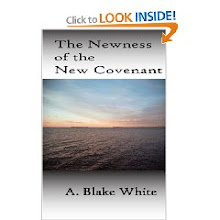 The following post is a continuation from yesterday's. It picks up right where we left off (II. Distinctions of CT).
The following post is a continuation from yesterday's. It picks up right where we left off (II. Distinctions of CT). Covenant of Grace
CT proponents argue that this covenant naturally flows from the covenant of redemption, and necessarily enters the history of man due to the failure on Adam’s part in the Adamic covenant. Because of Adam’s sin, God determined to establish another covenant by which man could be saved. CT argues that the covenant of grace describes the actual outworking (in time and space of redemptive history as God would determine it) of the covenant of redemption. The parties of this covenant are viewed as God and the elect people of God with Christ serving as the representative and mediator of these redeemed elect (Hebrews 8:6). The condition of this covenant is simply faith in Christ, who is our Mediator (Romans 5:1). The promise of this covenant is eternal life (Jeremiah 31-32; John 3:16). This particular covenant, it is argued, is manifested in various revelations. Yet, these various revelations are just that- revelations of the same covenant of grace.
CT proponents argue that this covenant naturally flows from the covenant of redemption, and necessarily enters the history of man due to the failure on Adam’s part in the Adamic covenant. Because of Adam’s sin, God determined to establish another covenant by which man could be saved. CT argues that the covenant of grace describes the actual outworking (in time and space of redemptive history as God would determine it) of the covenant of redemption. The parties of this covenant are viewed as God and the elect people of God with Christ serving as the representative and mediator of these redeemed elect (Hebrews 8:6). The condition of this covenant is simply faith in Christ, who is our Mediator (Romans 5:1). The promise of this covenant is eternal life (Jeremiah 31-32; John 3:16). This particular covenant, it is argued, is manifested in various revelations. Yet, these various revelations are just that- revelations of the same covenant of grace.
Those holding to CT propose that the first revelation of this covenant occurred, of course, in the Garden of Eden directly following the fall (Genesis 3:15 ff.). This first revelation is followed by the other revelations including:
· Noahic Covenant
· Abrahamic Covenant
· Mosaic Covenant
· Davidic Covenant
· New Covenant
Now that we have flown over CT to capture a bird’s eye view, allow me to point out some features of CT that distinguish it from DT primarily. These features also distance it from NCT to a degree. First, as pointed out above, CT utilizes Scripture’s many references to “covenant”. The term “dispensation” is sometime used by CT adherents (Hendriksen’s New Testament Commentary is notorious for this), however they are referring to the various revelations of the one covenant of grace. So they are not agreeing with the DT when they use this term. In distinction from the dispensationalist, the covenant theologian emphasizes the continuity in which God relates to man throughout redemptive history. The dispensationalist does the exact opposite- emphasizing discontinuity (this is the point of emphasizing dispensations).
· Noahic Covenant
· Abrahamic Covenant
· Mosaic Covenant
· Davidic Covenant
· New Covenant
Now that we have flown over CT to capture a bird’s eye view, allow me to point out some features of CT that distinguish it from DT primarily. These features also distance it from NCT to a degree. First, as pointed out above, CT utilizes Scripture’s many references to “covenant”. The term “dispensation” is sometime used by CT adherents (Hendriksen’s New Testament Commentary is notorious for this), however they are referring to the various revelations of the one covenant of grace. So they are not agreeing with the DT when they use this term. In distinction from the dispensationalist, the covenant theologian emphasizes the continuity in which God relates to man throughout redemptive history. The dispensationalist does the exact opposite- emphasizing discontinuity (this is the point of emphasizing dispensations).
Second, CT allows the New Testament Scriptures to interpret the Old Testament Scriptures when it comes to prophetic passages (passages dealing with promises to Israel). This accounts for their position that the true Israel is the church. They see the promises given to ethnic Israel in the OT as being fulfilled in the church. They give logical priority to many passages in the NT which affirm this, the most obvious being Galatians 6:16; Romans 11; Acts 15:14-18; Revelation 3:9; Romans 2:28-29; and Philippians 3:3. On the other hand, CT allows the OT to interpret the NT on other key points.
Third, CT main purpose seems to be more Gospel centered than DT. It teaches that God’s primary goal is to bring glory to Himself by redeeming His one people from their sins through the work of His Son Jesus Christ. This is God’ s only “program”. He does not possess two programs: one for ethnic Israel, one for the church. In other words, He does not have one purpose for national Israel, and one purpose for the church. The church is not a parenthesis; it’s not plan “B”.
A final distinction of CT, which flows from those listed above, includes a belief that the church existed in the Old Testament. The church began with the Abrahamic covenant. The other two systems (DT and NCT) argue that the church began on the day of Pentecost.
Tomorrow I will conclude my commentary on CT by giving a brief dissection regarding some of its important features. I apologize to those of you who desire for me to “speed the train up”. However, I just do not want to be guilty of information overload. Nevertheless, I appreciate the eagerness of many of you, and will try and “bang” out these posts a little quicker. As you can see, my preaching is similar to my writing….I move very s l o w. Sorry. Please bear with me.
Yours,
Andy








No comments:
Post a Comment